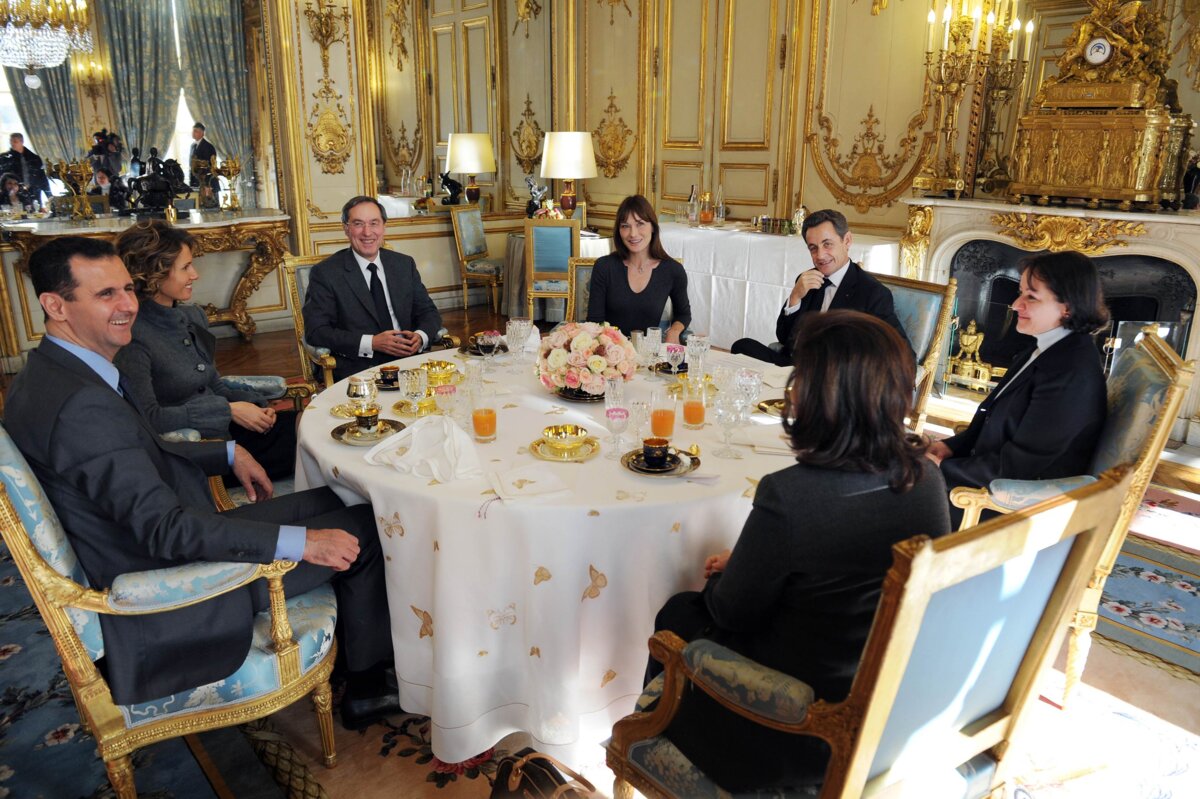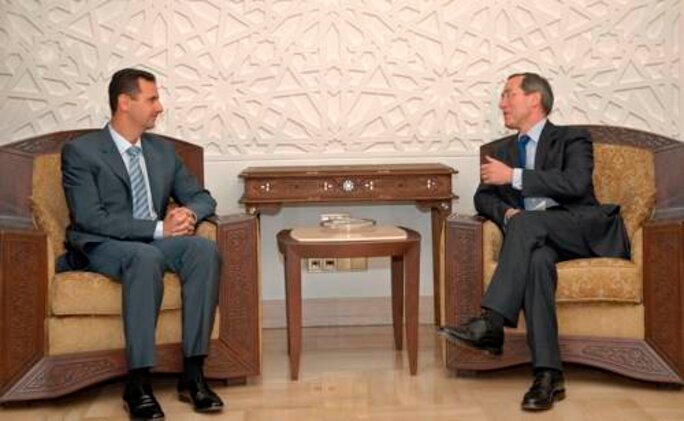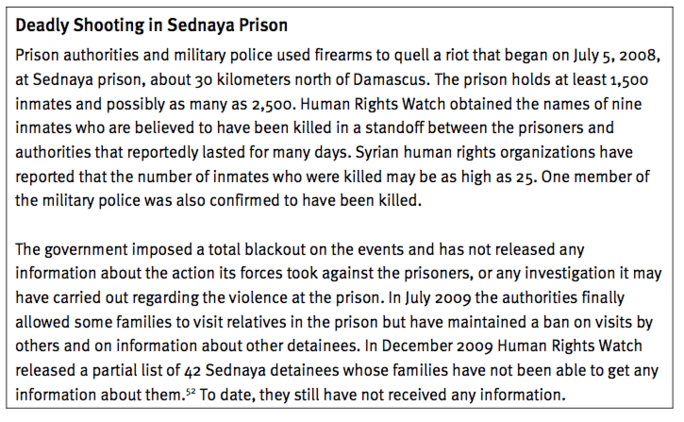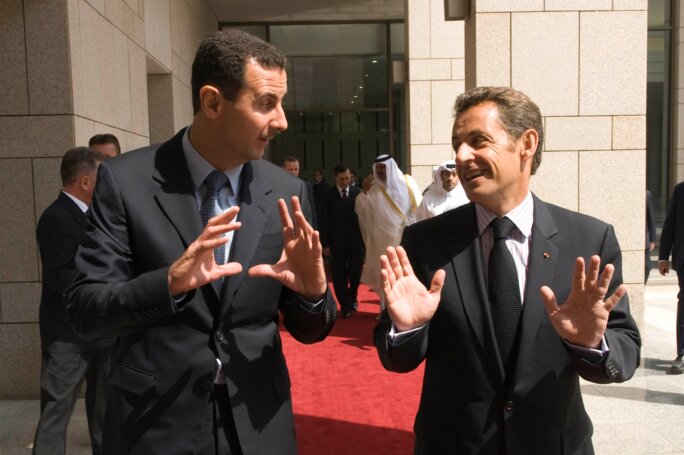Former French president Nicolas Sarkozy finally broke a three-month silence he had kept since failing in his re-election bid in May, with a call for urgent international intervention against the regime of Syrian dictator Bashar al-Assad.
Earlier this month, Sarkozy held detailed talks with Syrian opposition leader Abdulbaset Sieda, president of the Istanbul-based Syrian National Council. A statement signed by the two men and released on August 8th said "they noted a total convergence in their views on the seriousness of the Syrian crisis as well as the need for rapid action by the international community to avoid massacres."
"They agreed that there are great similarities with the Libyan crisis," the statement added.
Sarkozy’s return to the public platform was a thinly-disguised attack on his socialist successor, François Hollande, who the former president’s conservative UMP party have criticised as being ineffective and indecisive over the crisis in Syria.
Sarkozy’s statement was widely reported in the international media, and provoked a furious reaction among the socialists. “I’m amazed that Monsieur Sarkozy should want to create a controversy on such a serious subject,” commented foreign affairs minister Laurent Fabius. “You expect better of a former president.”
Socialist Party leader Martine Aubry described Sarkozy’s statement as “a mediocre campaign because it uses, for base political reasons, the suffering of the Syrian people who are fighting for their freedom and against tyranny.”
“Does it need reminding – and the French people do remember – that he welcomed Bashar al-Assad to Paris with all the honours in December 2010?” she asked, referring to the Syrian dictator’s third official visit to Paris under Sarkozy’s presidency.
As Mediapart has previously revealed, Sarkozy established secret and close relations with both Bashar al-Assad and the late Libyan dictator Muammar Gaddafi, during which both Arab despots were hosted in Paris amid great pomp and ceremony by the former president, whose aids, meanwhile, established lucrative business deals with both the Assad and Gaddafi regimes. (See links to Mediapart's investigations at the end of this article, page 3).

Enlargement : Illustration 1

The former French president’s statement this week calling for foreign intervention in Syria is in stark contrast to the extent and nature of Sarkozy’s past dealings with the Damascus regime, about which Mediapart exclusively reveals here further details.
Sarkozy’s long courtship of Assad dates back to 2007, when the preparations for a new rapprochement between France and Syria were orchestrated by Paris-based arms broker Ziad Takieddine. The Franco-Lebanese businessman, who reported directly to Sarkozy’s chief-of-staff, Claude Guéant, was responsible for all the essential diplomatic contacts between the two countries, beginning in 2007 and bypassing – in a quite unusual manner - the official channels of the French foreign ministry.
Takieddine, 62, is currently at the centre of an ongoing judicial investigation into a suspected scam built around the illegal funding of political activities in France via the siphoning off of commissions paid in French weapons sales abroad. This wide-ranging investigation, led by Paris magistrates Renaud Van Ruymbeke and Roger Le Loire, involves contracts established from the mid-1990s and up until the latter period of Sarkozy’s term in office.
The investigation has thrown up detailed evidence of the close contacts between Sarkozy and his aides and the Assad regime, notably through the records kept by Takieddine and which have been seized as evidence by the two judges. The confidential reports, to which Mediapart has gained access, provide for sobering reading.
Assad's glowing praise

Enlargement : Illustration 2

Takieddine has himself confirmed the authenticity of the secret files held as evidence by the magistrates, including many stored on his private computer. One of these is a copy of a handwritten summary in Arabic by Takieddine of his recommendations of what Sarkozy should say to Assad in a phone conversation the two leaders were to hold on May 30th 2008. The discussion was the first significant step in personal contact between Sarkozy and Assad, and which Takieddine had spent months preparing in his role as a behind-the-scenes diplomat.
Reproduced exclusively here (1), the summary, entitled “The phone call Bashar-Sarkozy”, is a scripted series of comments to be used by Sarkozy in his chat with Assad. It reads as follows:
“I chose Claude Guéant assisted by Ziad Takieddine, who have done a remarkable job in building the strategic partnership between us and who will in the future be the guards of this relationship.”
“I hope that you will, on your side, designate those you consider to be able to continue with these contacts and to present concrete propositions. I hope that you regard this phone communication as a “new page” in our bilateral relations and the strategic relations that will be further developed by the exchange of visits.”
“A few days ago I signed a letter that includes an invitation that is addressed to you for your participation at the Union for the Mediterranean summit in Paris on July 13th. I promise to take good care of your visit and to invite you as France’s guest of honour for the July 14th celebrations.”
The “July 14th celebrations” refers to France's traditional yearly Bastille Day military parade and fly-past, when a ceremonial tribune is erected at the foot of the avenue des Champs-Elysées where the French head of state and foreign dignitaries gather to watch the celebrations.
“I am ready to explain to you my ideas regarding the Mediterranean Union during my visit to Damascus, which will follow my visit to Beirut,” the note concludes.
The document also refers to the hope of developing French commercial interests in Syria, notably oil exploration and weapons sales.
After the phone conversation was finally held, Takieddine then wrote up a summary of what was actually said, and which included the very same comments he had recommended in his notes reproduced above.
Takieddine, with the backing of the presidency, took every opportunity to bypass the services of the foreign affairs ministry, which was at the time headed by Bernard Kouchner. The early, high-level preparatory trips to Syria were made by Claude Guéant, and organized from beginning to end by Takieddine, who sent the then-Elysée Palace chief-of-staff the following note of gushing - and intriguing – words: "I wish you a very good trip and a well-merited grand success [...] For all that you do, for all that you have done, for all of that, immense thanks. Friendly wishes, Ziad."

Takieddine’s principle contact on the Syrian side was Syrian foreign affairs minister Walid Muallem, who is still in his post today. In a report dated June 16th 2008, the day after Guéant met with Assad in Damsacus, Takieddine sent the Elysée chief-of-staff what he called ‘A summary of my conversation this morning with Walid Muallem. "Your visit and the meetings held in Damsacus, yesterday, have been very productive and constructive,” he wrote. “They constitute an essential step in the Franco-Syrian rapprochement."
He continued: "My interlocutor particularly wanted to inform me of their determination to develop bilateral relations between France and Syria, and this in every domain."
Takieddine also mentioned Assad’s glowing praise for Guéant. "My interlocutor particularly wanted to confirm the excellent impression that Monsieur Claude Guéant continues to give to President Assad, as well as to himself. They consider him as an exceptional man and it is he who will assure relations at a very top level."
On July 7th 2008, one week before Assad's ceremonious official visit to Paris, Takieddine travelled to Damascus to meet with the Syrian dictator in person. In a report prepared for Claude Guéant the next day, July 8th, he wrote: “The new and essential element in the Middle East over the recent period is the Franco-Syrian rapprochement.”
Takieddine noted that the Syrian dictator told him that "in the same way that the French President is concerned about the perception that French public opinion will have of the Syrian President's visit to France, Arab opinion also watches with much attention what will result from the visit".
-------------------------
1: First translated from Arabic to French by Ziad Majed, the contents reproduced here have been subsequently translated into English for this article by Mediapart.
'The sparkle of the visit touched Assad'
To prepare his visit, Assad agreed to give an interview to French daily Le Figaro, which Takieddine observed in his notes was "remarkably well led" by the paper's editorial director Etienne Mougeotte. Mediapart has disclosed the links between Mougeotte and Takieddine in a previous report in this series. Takieddine underlined that “Monsieur Assad referred to his engagement for the development of public [sic] liberties in Syria.”
Just days before Takieddine wrote those notes, a standoff between rioting prisoners and guards at Syria’s Sednaya military prison some 30 kilometres from Damascus, where political opponents to the regime were detained, had ended in a bloodbath. The events were denounced by the le Syrian Human Rights Committee on July 5th 2008. Below is a report on the shootings prepared by the international NGO Human Rights Watch .

Enlargement : Illustration 4

The tragic events at the Sednaya Military prison went largely unreported in France, where Bashar al-Assad duly took his place as guest of honour amid the pomp and ceremony of the official Bastille Day festivities. In terms of improving Assad’s image abroad, the operation was a success, a high-profile display of his acceptance by a leading western power, three years after the assassination of Lebanese President Rafic Hariri which Syria was suspected of having organized.

Enlargement : Illustration 5

Immediately after Assad's visit to Paris, Takieddine again travelled to Damascus, on July 17th 2008. In his report about the trip, Takieddine detailed the warm greetings of the Syrian regime and how all appeared on perfect course for Sarkozy's visit to Syria, planned for September of the same year.
"President Bashar al-Assad and Monsieur Walid Muallem particularly wanted to transmit a message of thanks and friendship to President Nicolas Sarkozy, and also to Monsieur Claude Guéant, for the welcome and also the atmosphere of confidence in the manner in which the subjects had been approached, which allowed this visit the sparkle that particularly touched President Assad," wrote Takieddine.
"President Assad believes that a new page in relations between Syria and France has now been opened," Takieddine continued. "He believes that this involves strong actions from both sides."
The French president paid a reciprocal official visit to Damascus on September 3rdand 4th 2008. Two days later, Takieddine wrote a confidential report summarizing official Syrian reaction to the visit. Assad wished to send Paris “a message of thanks and friendship” wrote Takieddine, who underlined the “atmosphere of confidence that reigned throughout the visit”.
"President Assad is very satisfied to have been able to establish a personal relationship with President Sarkozy," he noted. "President Assad thanks France for its decisive role regarding Syria's position in the international ‘concert' [...] President Assad took proper note that, in a general manner, the French press, for the first time, adopted a globally very positive tone concerning Syria, its President and the visit to Damascus by President Sarkozy."
-------------------------
For more about the issues raised in this article, click on the links to Mediapart's investigations below:
France's secret diplomacy with Syria, and the arms dealer who played secret emissary
French government stalls Interpol call for arrest of Gaddafi funding chief
Sarkozy attacks Mediapart over Gaddafi funding revelations
Gaddafi funding of Sarkozy election campaign: the proof
Exclusive: secret report describes Gaddafi funding of Sarkozy's 2007 election campaig
French IT group Bull horned by Libyan internet espionage deal
French judge finds key evidence in illegal funding probe
Net closes in on French presidency after funding 'scam' arrests
Arms dealer probe brings illegal funding scandal closer to Sarkozy
The secret financier who brings danger to the Sarkozy clan
Sarkozy, the arms dealer, and a secret 350 million-euro commission
Exclusive: how Sarkozy's team sought grace for Gaddafi's murderous henchman
Exlusive: how President Sarkozy's team dealt with Gaddafi
When Total paid the bill for the Elysée's secret emissary
The French-built stealth offroader that may be hiding Gaddafi
-------------------------
English version: Graham Tearse


